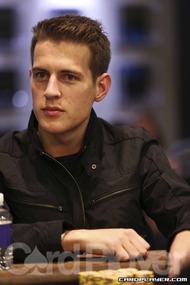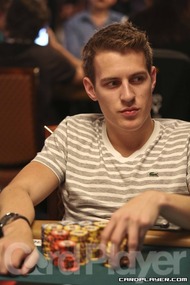






Mike McDonald: Canadian Poker Pro Discusses Recent Success and Career MotivationsMcDonald Explains Why He Plays Poker For Money, Not Glory |
|
|

Mike McDonald
McDonald, known as ‘Timex’ in the online poker community, has now earned a total of $9.95 million in live tournaments and sits in 21st place on the all-time tournament earnings leaderboard.
Most recently, McDonald finished runner-up in the 2014 PokerStars Caribbean Adventure main event for $1,064,865. He followed that up with another second-place showing in the $100,000 buy-in Aussie Millions High Roller for $1,343,250 and then took third in the $250,000 buy-in Aussie Millions Super High Roller for $1,687,460, giving him three seven-figure scores in less than a month. He now sits in first-place in the Card Player Player of the Year race with 3,200 points, giving him a 200-point lead over PCA main event winner Dominik Panka.
McDonald took some time out to talk to Card Player about his start in poker, his motivation for playing and what he learned in his six-year career.
Julio Rodriguez: How exactly did you go from chess to poker?
Mike McDonald: My chess coach used to play online poker to supplement his income. One day after chess, he offered to teach me the basics of poker. I knew nothing about the game, but I thought it would be cool. We talked about some beginning strategy and after that I put some money online and began down the path that eventually led to where I am today.
JR: How does one go about teaching the basics of poker in a way that keep someone interested? I find that most people don’t have the patience to learn such a complicated game from scratch.

McDonald at the WSOP
Then he offered up his own analysis of the session so I could get a better idea of what kind of information was out there. Then there were a few sessions of small-stakes limit hold’em where he explained basic strategy such as being tight-aggressive, value betting and how to get the money in with the best of it.
My first sessions were played at the penny stakes. By about the third session I had figured things out to the point were I was profiting and I’m fortunate to say I haven’t been in the red since.
JR: You were just 18 years old when you started playing the live tournament circuit. What did your parents think of your decision?
MM: My parents have always been really supportive. Their main concern was that I was never losing money that I couldn’t afford to lose and that I wasn’t taking unnecessary risks. They trust me enough to know that I’m trying to capitalize on an opportunity, and not just throwing money away.
JR: You became the youngest European Poker Tour champion in history when you won the 2008 EPT German Open main event at the age of 18. What are your thoughts on that win today now that you’ve had over half a decade on the tournament circuit?
MM: At the time, I definitely took it for granted. The games were so soft back then that I was under the impression that I was going to win one or two major tournaments each year. So I was a little naive in my expectations. Since then, I’ve learned just how tough variance can be, which makes me even more thankful that I was able to get such a big score just five months into my live poker career.

McDonald at the 2014 PCA Final Table
JR: The PCA main event had over 1,000 players and you routinely put up six-figure buy-ins for all of the Super High Roller tournaments you enter. Do you ever get nervous or has that been erased by all of your experience?
MM: For the most part, I don’t get nervous. However, there have been a few times where I caught myself feeling a little big uncomfortable. For example, during day 3 of the PCA main event, I had been sick all week and I felt like my composure was a bit off. I was being a bit of a tellbox, so I was fortunate to fight through that and make it into the later stages of the tournament. As for the High Roller events, I wouldn’t be entering the tournament if I wasn’t comfortable with it. That goes back to my parents and not losing money I can’t afford to lose.
JR: You finished runner-up in the PCA main event and have a lot of other huge scores on your resume, but no marquee wins since your Epic Poker main event in 2011. Do you ever get down on yourself after failing to close out a win or are you satisfied with your deep runs?
MM: When I was first getting started, I was definitely more of a play-to-win type of a player, but I’ve come to terms with the fact that poker is my job. My goal is to make as much money as I can. Obviously first place pays more than second place, but I’m no longer one of those guys who is disappointed with anything but a win.
Most players in my social circle feel the same way, but I know of a lot of other poker players who feel differently. Some players have different incentives. They might have sponsorship deals that take care of their buy-ins, so their main motivation is to come out on top. I play in a tournament hoping to make money. If I make money, then I’m pleased with the outcome. I’m not playing for the glory. I think that basing your self-worth on how many titles you win is just a recipe for being unsatisfied and unhappy.
JR: Since you brought it up, what do you think of your chances at becoming a sponsored player for an online poker site?
 MM: If it happens, it happens. Unfortunately, the prospects are very limited. Maybe I’m just more of a pessimist than most people, but I don’t really see poker in Canada exploding in popularity any time soon. Of course, if I won the World Series of Poker main event, I might be considered one of the most marketable people to come out of that group in the last decade, but short of that, it’s very unlikely that a sponsor will give me a call. There are just too many other players out there with similar or even more impressive resumes who are also unsponsored.
MM: If it happens, it happens. Unfortunately, the prospects are very limited. Maybe I’m just more of a pessimist than most people, but I don’t really see poker in Canada exploding in popularity any time soon. Of course, if I won the World Series of Poker main event, I might be considered one of the most marketable people to come out of that group in the last decade, but short of that, it’s very unlikely that a sponsor will give me a call. There are just too many other players out there with similar or even more impressive resumes who are also unsponsored.
JR: In 2010, you announced that you were taking some time away from poker and ever since, you’ve played a much more relaxed schedule. What are your plans for 2014 now that you are riding a hot streak?
MM: My recent results play no part in my decision to play more tournaments whatsoever. As for what my plans are in 2014, I have the EPT Grand Final in Monte Carlo and the WSOP main event scheduled, but that’s it. I’ll probably end up playing in some EPT Super High Rollers, but for the most part I’m going to continue taking it easy and carefully pick my spots.
